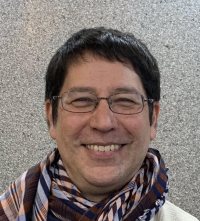
July 2022
This month's voice:
Joe Tomei, "Getting Old Sucks: Lessons from an Urgent-Care Scare"
Introduction
Lindsay Herron
Editor, KOTESOL Voices
This month, international member Joe Tomei shares an experience that really opened his eyes to the realities of aging—and the valuable lessons he learned as a result. His story is simultaneously relatable, horrifying, beneficial, and insightful; the piece normalizes discussing and sharing knowledge about health and aging even as it offers a glimpse into Joe's past, our shared present (both in the classroom and out!), and possible futures for all of us. Take care of your health, and happy reading!
Getting Old Sucks: Lessons from an Urgent-Care Scare
By Joe Tomei
It was 10 years ago. I had just turned 50 and was merrily getting to the end of the spring term. A week or two before classes were set to finish, on a Thursday evening, I was out with some friends and suddenly had these flashes of light in my right eye; immediately after that, it seemed as if a piece of clear but dirty plastic had dropped in front of my eye. There was no pain, and rubbing my eye didn’t do anything. I went home and told my wife what had happened. I said I’d see what it was like in the morning.
Morning came, and it was the same. Fortunately, I didn’t have classes on Fridays, so my wife said I should go to the eye doctor that morning—which was prescient of her (it often is). I went and the doctor examined my eye and said I was going to need to go to the hospital. I told him that it was the end of the term, but in August, I had some vacation time. The doctor replied no, I needed to go to the hospital right now. My retina had detached and an operation needed to be done immediately. I went home; my wife and I prepared what I needed for a one-week stay; and by 2 p.m., I was on the operating table being prepped for an operation to reattach my retina.
While retinal detachment is often associated with boxing or martial arts, where a punch or a kick might detach the retina, I learned that it is also common when people got older, as the fluid inside the eye, called the vitreous humor, changes to a jellylike consistency and can then pull the retina away from the back of the eye. This is exacerbated if you have weak eyesight because the deformation of the eye that is responsible for near-sightedness puts more tension on the retina, and if there are small tears, they can expand. I also learned, to my chagrin, that regular eye-checks can catch this; and by using a laser to seal the tears, the condition can be avoided. Coulda, shoulda, woulda….
The surgery was not too bad, but there were a number of knock-on effects that took me by surprise. They took out the lens in my eye (which is also done for people with cataracts) and put a new one in. However, the new one, being totally clear, made my right eye more sensitive to light, so driving at night, especially dealing with oncoming headlights, became problematic. The surgery also took about 10-15 meters off of my ability to recognize faces. Before the surgery, I could usually recognize a student’s face at a distance; and by the time we were facing each other, I could usually pull their name out of my memory. By taking off that distance, thereby reducing the amount of time I had, my ability to recognize students was impaired, and that lack of reinforcement meant that my ability to remember student names also took a hit. Reading became much more tiring in both English and Japanese, and I could feel my second language ability taking a hit as well.
It’s ten years later, and I’ve adapted in various ways. Japanese administrative work gets photographed so I can expand the view, while reading is 99% digital. I feel that as far as recognizing students goes, masking has made everyone take a hit, so my reduced ability is not as noticeable as it was.
This experience has also made me much more sensitive to issues of access and handicaps in my classes. If such a small problem can have such a great impact on me, what other kinds of challenges might my students face? It pushed me to investigate more how students are doing my work, especially when most of the work is on computers. Taking time to watch a student actually deal with an LMS interface may seem like wasted time, but it has given me a lot more insights into what trips up students. The general rule of an LMS is that there are always multiple ways to get to where you want to go. But I discovered some students were so path-dependent that they might get to their assignment by clicking through four or five pages even though there was a separate page set up to list their assignments. And I still meet students who are using two single quote marks to make a double quote; depending on the font, you can't tell they do this, unless you watch them hit the key twice. But now that I know it is a possibility, I can be on the lookout for it. It also has me investigating other options that may hit a sweet spot. Currently, I'm giving students time in class to use speech-to-text. I don't think I would have considered these things had I not had vision problems.
There’s a long-standing joke about how old people always spend their time talking about injuries and aches and pains. But I realize that one of the reasons we talk about these is to sort of share knowledge; and one thing I realized after this was that not only is there a tendency to avoid discussing health issues here in Asia, our social circles are also more constrained here, meaning fewer people to share experiences with. I’d be very happy if this prompts you to get your eyes checked, but I also think that we should share our stories more.
About the Author

Joseph Tomei is a professor in the Faculty of British and American Studies at Kumamoto Gakuen University (Japan). He has taught EFL in France, Spain, Korea, and Japan at the primary, secondary, and tertiary levels and has organized teacher workshops in Vietnam, Myanmar, and Kyrgyzstan. He had the pleasure of spending a sabbatical year at Daejeon University (Korea) the year before everything went to hell in a handbasket and is biding his time to get back to Korea. In addition to his interest in computer-mediated communication, he also is interested in the application of functional/typological grammar to language teaching, practical activities in the language classroom, and writing instruction; and his doctorate from the University of Birmingham is on the use of metaphor by EFL writers.


